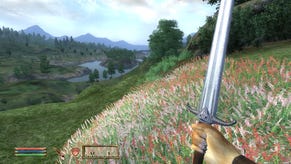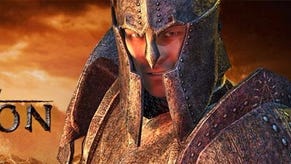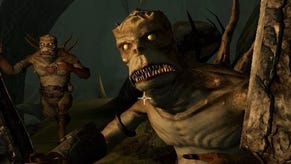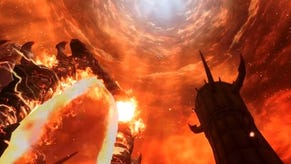The Elder Scrolls IV: Shivering Isles
I'm mad, me. Crazy.
Oblivion had more than its fair share of extra baubles and adventures tacked on over the past year, but this is the big one: a full-blown expansion. Not just another quest arc, but a full-blown extra plane of Oblivion, complete with hordes of new monsters, NPCs and items. Although not as enormous as the landmass of the original game The Shivering Isles are an entirely new geography in which to take up quests, wander aimlessly, club wrong-doers, and rummage around in mushrooms.
On being notified by the game that you've heard of goings on with a portal on an island in the Bay of Niben, you are able to seek out The Shivering Isles. It's a bit of a clumsy introduction, but we'll forgive it that. The expansion pack, like all of Oblivion, adjusts to your level, meaning you can go into this new realms from the very start of the game, or with a high experienced character. On entering the portal (which you have to activate half a dozen times, inexplicably) you are challenged by some kind of chamberlain chap in a room that collapses into butterflies. He tells you to seek out the big boss, his boss, Sheogorath The Prince Of Madness. This brief interview and instruction leads on to a no-man's land outside the isles, and a set of gates - The Gates Of Madness.
Once the gatekeeper and early quests are dispensed with, the game plays a neat trick. The Shivering Isles exists in two different parallel realities, Mania and Dementia. These are suppose to represent the different qualities of the lord of the realm, Sheogorath, although The Prince only really seems intent on exhibiting his manic side. Anyway, the two versions of the Isles must be accessed separately from the different gates, giving you what are essentially two thematically polar, although geographically identical worlds to explore. Mania is bright and colourful, and filled with manic drug-loonies, while dementia is gloomy, dark, and inhabited by depressive paranoids. Each has its own quests, and its own residents.
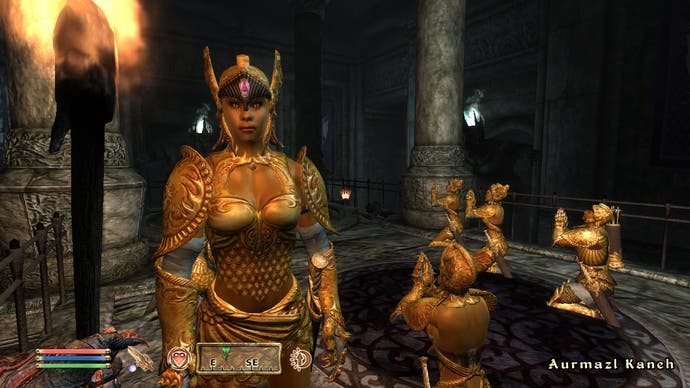
Both realities are profoundly beautiful, as you might expect. The Shivering Isles is arguably even more interesting to look at than the original game, going for a more fungal, warped look than the soft-focus fantasy of Oblivion-proper. It's far closer to Morrowind than the original, and that's a good thing. Exploring The Shivering Isles for its own sake is a delight, but it's a genuine shame that the game itself gives you far less incentive to get lost in the woods than it did the first time around. There aren't many hidden villages, and the odd quest-related encampments and shrines you'd find in the original game seem to be few and far between in this new plane.
But anyway, there's a rather more significant problem trotting along behind all this madness stuff, one that does degrade the entire experience. It's this: if you're going to use madness as your core fictional motif, then it suggests you're going to pull out the big guns in terms of story-telling. You know the stuff - paranoia, hallucination, betrayal, trickery, illusion, misdirection, and outright weirdness. A realm of pure madness shouldn't be, well, a teeny bit dull. And that's the problem: The Shivering Isles is mildly eccentric and quite pretty, but it's definitely not ecstatically, brain-boiling insane. As such it's a wasted opportunity. All the characters you meet are supposed to be loonies, but instead they generally just say something a bit odd when you meet them. They have over-the-top character traits, but isn't that a bit like all videogame characters, ever? Instead of making us want to take a step back with this screaming lunacy, or putting a chill in our bones with their grotesque fantasies, they're just a mildly weird. One guy is interested in meat (who isn't?!), another is a bit patronising. One person believes she's going to die, another is worried about diseases. One guy is hungry. Are mad people just hungry? It would explain a lot. One guy - get this - wants a house. The crazy fool!
All this might be excusable with a grand turn from the prince himself, but he's just vaguely amusing. It's a childish portrait of a lunatic. He's like the evil madman might be in a children's TV show - all camp and without substance. He never really seems threatening, in the way that the truly disturbed do. It's all an act, and thank goodness he's got quests to dispense so you can get back into that exquisite world...
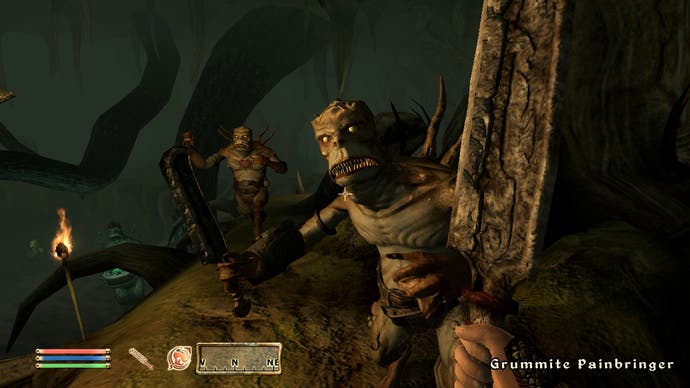
And, well, that's another less than satisfactory subject: quests. The overall story-arc is splendid, and well told with it: The Knights Of Boredom are coming along to normalise things, and the forces of madness must put a stop to it. That, I like. It's just all the tasks you have to perform along the way that seem under the bar. There's none of the expectation-defying intrigue and guile that made Oblivion's quests so compulsive. You're killing this, fetching that, and basically clearing out a load of uninspired dungeons. I'm glad to be back in the world of Oblivion again, but really, I was hoping for some more interesting quests than this. The tasks set for you by mad people should, surely, entail some disturbing or alarming situations, but really there's not much to report. It makes you realise how good Oblivion actually was.
Also there's no horse. I really liked my horse. I liked how he stood around waiting for me to kill goblins. He was company when I was alone in the woods. And now I have to walk everywhere. I miss my horse.
And so to the conclusion. I can't see anyone who enjoyed Oblivion enough to get through the main quest not buying this. There's lashings of new fighting and exploring, and it's more gorgeous than ever before. But maybe it was just the artist's turn to smoke the hookah of inspiration. There were plenty of people for whom the easily-broken game mechanics and problematic levelling system of Oblivion was too tortuous to contend with. This expansion does nothing to fix any problems these folk might have had - it's just the same game as it ever was, only this time with a slightly weirder backdrop, and less interesting questing.
Of course this lack of inspiration could (just maybe) mean that Bethesda are pumping all their creative gunk into the newly resurrected cadaver of Fallout 3, which would really be a good thing... Wouldn't it?

